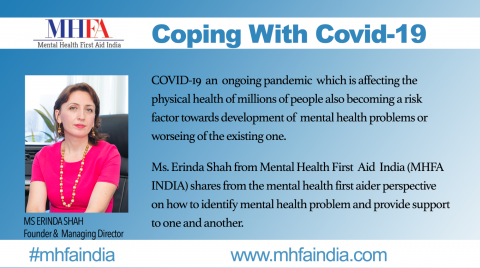
COVID-19 is an ongoing pandemic that has affected populations on all the continents of the globe. Populations who have been affected by the illness are undergoing varied emotions due to the scale and rapidity of the pandemic. It is very important to take precautions during this time to stay safe from getting infected. At the same time, it is equally important to take care of our mental health too. Who is at risk during this time, and what are the possible mental health effects experienced during this time?
Who should take care?
There are certain high-risk individuals who need to take care of their mental health during times like this.
- Vulnerable groups, such as children and young adults, are at risk, but they can recover more resiliently. Similarly, dependent populations such as elderly individuals and physically disabled persons, are also at risk of developing mental health problems.
- Persons with pre-existing mental health disorders can experience a relapse or worsening of their mental health.
- Individuals with poor coping capacity, habitual substance abusers, and people with long-standing chronic general medical conditions are also at high risk of developing mental health problems.
- The health workers, allied health workers and support staff In case of COVID-19, are also at a high risk of mental health problems due to working conditions, anxiety, stress and pressure.
What mental health problems can develop?
Usually, a range of mental health disorders can manifest during the time of a global disaster or a pandemic like COVID-19.
- Anxiety disorders
- Adjustment disorders
- Non-specific physical symptoms
- Mood disorders
- Substance abuse
are some of the disorders that can be experienced by the population during a pandemic.
- Depression may also co-exist with these conditions.
It is possible to go through a range of emotions, like
- overwhelming emotions and fear of losing control of the situation.
- Crisis situation such as Suicidal thoughts, Non-Suicide self-injury, and sudden increase in substance use can emerge in case of tragic losses such as the loss of a person, money, possessions, etc.
How do I provide help?
Some of the remedial actions that can be taken during this time are:
- Look for deteriorating signs of mental health, like
- The sudden change of mood and behaviour
- loss of interest in communication and keeping in touch
- Spending excess time on Social media
- Worried all the time
- Easily agitated, restless or isolated
- Talking about ending life or sounding hopeless
- Poor hygiene and appetite
- Excess drinking or smoking
- Monitoring for any relapse or worsening of mental health in persons with a history of mental health problems or Illness.
- Speak to the person on how they are feeling and what their thoughts are.
- Look for ways to keep up with existing medication. In the case of dependent persons, stock up on medicines for the next few weeks.
- Check on any crisis, like Suicidal thoughts or emerging Panic Attack
- Provide emotional support by talking to people who are unable to cope up with the situation.
- Provide practical support for reaching professional help like a GP, psychologist, or therapist.
- Avoid judgmental comments, blaming, or ridiculing.
- Continued monitoring of high-risk persons.
- Involving family members or caretakers of elderly persons to give appropriate support to them.
- Take care of yourself and stay safe


